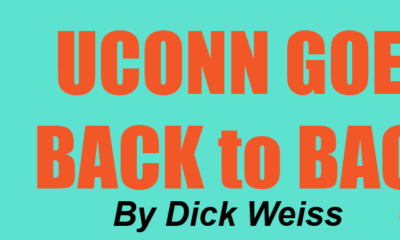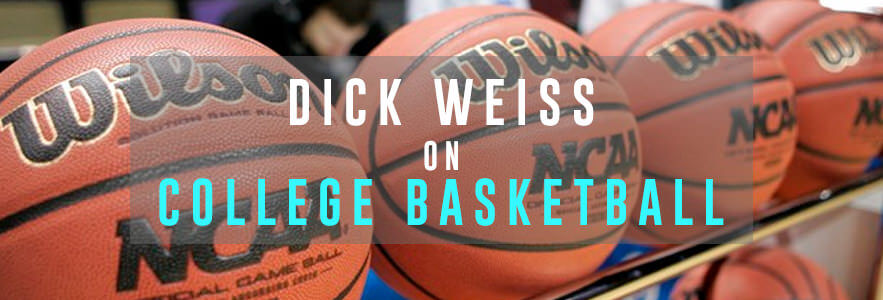NEW YORK– The latest NCAA basketball corruption scandal has left a nasty scar on the sport that refuses to go away.
NCAA president Mark Emmert, speaking at the Learfield Intercollegiate Athletics Forum here, suggested the college athletics community is “disgusted and embarrassed” by the FBI investigation and must address several areas to clean up the sport. Five major conference commissioners– Val Ackerman of the Big East, Larry Scott of the Pac-12, Greg Sankey of the SEC, John Swofford of the Atlantic Coast Conference and Bob Bowlsby of the Big 12- also weighed in on the subject at the high profile seminar at the Crown Plaza Hotel.
Emmert listed five areas for the newly formed Commission on College Basketball to examine: the NBA, shoe companies, agents, grass roots and summer basketball, and the involvement of the NCAA committee on infractions to enforce the rules. In October, Emmert appointed former U.S. Secretary of State Condoleeza Rice to chair the committee, which includes former college and NBA stars David Robinson and Grant HIll. The committee will deliver its recommendations at the NCAA Division I Board of Directors meeting in April.
“The worst possible outcome,” Emmert said, “is that, confronted with these kinds of facts, the association, the member universities and colleges say, ‘Nah, that’s OK’ and move on.”’
The FBI investigation two months ago targeted shoe company execs, agents and four assistant basketball coaches accused on taking bribes to buy players and push them toward certain agents. Auburn’s Chuck Person, Oklahoma State’s Lamont Evans, Arizona’s Book Richardson and USC’s Anthony Bland were all arrested in September, along with James Gatto Jr., director of global sports marketing for Adidas; and have since been indicted. “The shoe companies are some of the most creative marketers in the world,” Emmert said. “I’ve got to believe you can sell shoes without bribing people to do that.”
The fallout hit one of the biggest programs in the sport when the University of Louisville fired Hall of Fame coach Rick Pitino less than three weeks after allegations surfaced that coaches at a university matching Louisville conspired with Adidas to pay $100,000 to the family of Brian Bowen, a McDonald’s All American, to play at Louisville and to represent Adidas when he turns pro. Bowen was cleared by the FBI according to his attorney but cut loose by the school after an internal investigation. Pitino maintains his innocence and is suing the school for $38 million, the remainder of his contract.
Emmert has been a big advocate of a system that would allow NBA-ready players to enter the draft right out of high school rather than spend a mandatory year in college while adding the NCAA has no legal right to enforce that policy. Currently, players have to be either 19-years old when they declare for the NBA draft or have played at least of season basketball. Emmert wants to eliminate that rule so students stop using colleges to pay for one year of basketball while they prepare to be an NBA lottery pick. “Is this part of someone being part of your university or is it using college athletics to prepare yourself to be a pro? If it’s the latter, you shouldn’t be there in the first place,” Emmert said.
Last year, 12 of the top 14 picks in the 2017 draft were freshmen. This year, eight of the top 10– led by forward Marvin Bagley and 7-0 DeAndre Ayton of Arizona– are freshmen.
It’s time to take a proactive line to put the student back in student-athlete.
“The will is there,” Swofford said. “If not, we have a problem. Certain situations have crossed federal lines.”
“I think the will to make change is there,” Ackerman said “The question is what can be done? Everybody in the NCAA was affected and saddened, especially the coaches because they’re proud of what they do. A vast majority do things the right way and they are concerned profession has been damaged in, hopefully not a irreversible way, but certainly a meaningful way. A lot of people are hard at work trying to figure out a way to recreate a system that is a bit more corruption proof and could lend its self to more enforcement. Cheaters will probably always cheat. We have to find a way to make less cheaters.or catch the ones who do it. So i think the NCAA enforcement issue is probably primary.
“I also think there will be some focus on the elite player pathway to the NBA. That’s bigger than than NCAA because it includes how players advance in pre-collegiate, non scholastic basketball that’s an unregulated area. There’s no national governing body to regulate pre collegiate, non scholastic basketball.”
Some college coaches are even subtly lobbying for the end of summer basketball as a way to control travel team coaches who receive significant financial resources from shoe companies to recruit the best players and steer them to universities sponsored by NIke, Adidas and Under Armour or cut side deals with agents.
“Then there is the question of when players can go to the NBA,” Ackerman continued. “I’m of the opinion they should be able to go right way I’ve seen a lot of disruption that one and done can because there are players who don’t want to penned into a holding pattern. That should be examined. i know (NBA commissioner) Adam Silver. There has to be some collaboration between the colleges and NBA and i think USA basketball should have a piece of it. I like the work they are doing with coaching certification and managing the junior national team with the top 50 players.”
On the surface, it looks like nothing will get done without the cooperation of the NBA Players’ Association. But Ackerman feels that shouldn’t be a problem.
“The union has always been, ‘Why can’t they go right away?’ The NBA feeling is ‘Why shouldn’t they have a bit more time? Draft rights are precious. Team owners don’t want make mistakes. They’re the ones pushing for one and done, two and done. To go back to zero and done is a union friendly position.”
Sankey thinks part of the problem can be handled internally.
“We had four assistant coaches, four out of 1,000 who were indicted,” he said. “The expectation is there will be more. But there hasn’t been. This is more than a one and done issue. It’s about creating a healthy culture for the sport and one of the indicators to me it’s not a healthy culture is the number of quotes I’e read that say, ‘I’m not surprised.’ There are too many bystanders out there who don’t feel like they have the ability to change individuals. The question is, can we affect change collectively. It’s not enough to pass it along to a working group. There has to a total buy in for rules and polices. One of the issues that has to be dealt with is, ‘It’s about them and their program.’ This is about us. It’s about hiring coaches who are trustworthy. We can recruit in the summer, not recruit in the summer. Unless the people involved are trustworthy, it’s not going to work. This is about integrity. We all need to be accountable.”
Dick Weiss is a sportswriter and columnist who has covered college football and college and professional basketball for the Philadelphia Daily News and the New York Daily News. He has received the Curt Gowdy Award from the Naismith Basketball Hall of Fame and is a member of the national Sportswriters Hall of Fame. He has also co-written several books with Rick Pitino, John Calipari, Dick Vitale and authored a tribute book on Duke coach Mike Krzyzewski.




